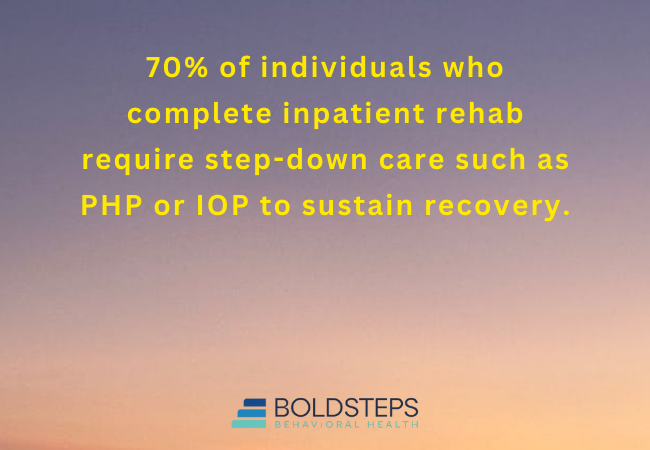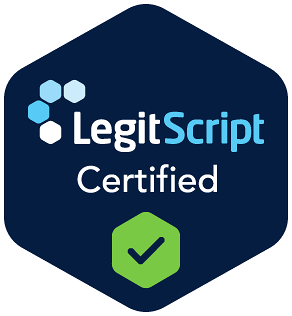Recovery from addiction is a lifelong process that requires structured support, therapy, and gradual reintegration into daily life. While inpatient rehab provides a secure environment for intensive healing, transitioning to independent living can be challenging without the proper guidance.
For individuals who have completed residential rehab but still need ongoing care before achieving full independence, a Partial Hospitalization Program (PHP) serves as a bridge between inpatient treatment and everyday life. This intermediate level of care allows individuals to receive intensive support while gradually regaining autonomy, ensuring a smooth transition to independent recovery.
At Bold Steps Behavioral Health in New Hampshire, our PHP provides structure, therapy, medical supervision, and real-world application of recovery skills. This guide will explore the benefits of PHP, its role in the addiction recovery journey, and how it helps individuals build a solid foundation for long-term success.
What Is a Partial Hospitalization Program (PHP)?
A Partial Hospitalization Program (PHP) is an intensive outpatient treatment model that offers structured care without requiring overnight stays. Individuals attend therapy and support sessions for several hours each day but return home in the evenings.
Key Features of PHP at Bold Steps Behavioral Health:
- Comprehensive addiction and behavioral health treatment.
- 5-6 hours of therapy per day, 5 days per week.
- Individual therapy, group therapy, and family counseling.
- Dual Diagnosis Treatment for co-occurring mental health disorders.
- Medical support, including medication management if needed.
- Personalized recovery plans and relapse prevention strategies.
- Transition planning for independent recovery or step-down to an Intensive Outpatient Program (IOP).
PHP provides the structured support of inpatient rehab while allowing individuals to apply recovery skills in real-life settings.
How PHP Helps Individuals Transition to Independent Recovery
1. Provides Structure Without Full-Time Residency
One of the biggest challenges after inpatient rehab is the loss of structure. Many individuals struggle with daily decision-making, time management, and maintaining accountability.
PHP provides a structured daily schedule, similar to inpatient rehab, but with increased personal responsibility. This balance ensures that individuals:
- Stay engaged in treatment while gradually adjusting to independence.
- Continue receiving professional guidance to prevent relapse.
- Practice applying coping strategies in real-world situations.
PHP helps individuals transition at a pace that ensures stability, confidence, and personal growth.
2. Addresses Mental Health Through Dual Diagnosis Treatment
Many individuals in recovery also struggle with mental health disorders, such as:
- Anxiety
- Depression
- PTSD
- Bipolar disorder
Without proper mental health support, individuals are at higher risk of relapse. Our Dual Diagnosis Treatment Program in New Hampshire ensures individuals receive therapy and medical support for both addiction and co-occurring mental health disorders.
This integrated approach helps individuals develop emotional stability and long-term resilience for a stronger recovery foundation.
3. Reinforces Essential Life and Recovery Skills
A successful transition to independent recovery requires practical skills for managing daily life. PHP teaches individuals:
- Healthy coping mechanisms for stress, anxiety, and cravings.
- Time management and responsibility to maintain routine and stability.
- Communication and boundary-setting skills for building healthy relationships.
- Problem-solving strategies to handle daily challenges without turning to substances.
These skills empower individuals to navigate real-life situations confidently while maintaining their sobriety.
4. Offers Intensive Therapy and Medical Supervision
PHP includes evidence-based therapy approaches to help individuals process emotions, address triggers, and prevent relapse.
Therapeutic Approaches in PHP Include:
- Cognitive Behavioral Therapy (CBT): Helps change negative thought patterns.
- Dialectical Behavior Therapy (DBT): Focuses on emotional regulation and mindfulness.
- Motivational Interviewing (MI): Strengthens motivation for lasting recovery.
- Trauma-Informed Therapy: Addresses past trauma contributing to addiction.
- Relapse Prevention Planning: Provides tools to handle triggers and high-risk situations.
Additionally, PHP provides medical support for individuals needing:
- Medication-Assisted Treatment (MAT) to manage cravings.
- Medication management for mental health stability.
- Ongoing medical supervision for physical health recovery.
5. Gradual Step-Down to Intensive Outpatient Program (IOP)
PHP prepares individuals for the next stage of recovery by helping them transition to an Intensive Outpatient Program (IOP).
At Bold Steps Behavioral Health, our IOP in New Hampshire offers:
- Flexible therapy schedules (3-5 sessions per week).
- Continued group and individual therapy to strengthen coping skills.
- Relapse prevention strategies for long-term sobriety.
This gradual step-down process ensures that individuals gain confidence in their independence while maintaining necessary support.
Building a Personalized Recovery Plan in PHP
At Bold Steps Behavioral Health, we believe that every recovery journey is unique. That’s why our PHP includes personalized recovery planning tailored to each individual’s needs.
Key Components of a Personalized Recovery Plan:
- Individualized Treatment Goals – Based on personal challenges, strengths, and progress.
- Daily and Weekly Therapy Sessions – Including individual, group, and holistic therapies.
- Support System Integration – Involving family therapy and peer support networks.
- Crisis Management Planning – Developing a structured relapse prevention strategy.
- Long-Term Success Strategy – Preparing for a transition to outpatient care or independent living.
This structured approach ensures individuals leave PHP feeling empowered, stable, and ready for long-term recovery.
Who Can Benefit from PHP in New Hampshire?
A Partial Hospitalization Program is ideal for individuals who:
- Have completed inpatient rehab but need continued structured support.
- Are at risk of relapse if they transition too quickly to independent living.
- Need Dual Diagnosis Treatment for mental health and addiction.
- Are ready for daytime treatment but can manage evenings independently.
- Require structured therapy and medical support to strengthen their recovery.
If you or a loved one is unsure whether PHP is the right next step, our team at Bold Steps Behavioral Health can conduct a comprehensive assessment to determine the best treatment plan.
Why Choose Bold Steps Behavioral Health in New Hampshire?
At Bold Steps Behavioral Health, we provide:
- Comprehensive addiction treatment programs at all levels of care.
- Dual Diagnosis Treatment for individuals with mental health challenges.
- Holistic and evidence-based therapies for long-term success.
- A compassionate team of professionals committed to each person’s recovery.
- Aftercare planning to ensure continued support post-treatment.
We also offer:
- Medical Detox Program in New Hampshire
- Intensive Outpatient Programs in New Hampshire
- Outpatient Treatment Program in New Hampshire
- Virtual Treatment Program in New Hampshire
Conclusion
Transitioning from inpatient rehab to independent living is a significant milestone in the recovery journey, but it comes with challenges that require structured support, professional guidance, and continued commitment. A Partial Hospitalization Program (PHP) acts as the essential bridge between intensive residential care and real-world recovery, providing individuals with the tools, therapies, and medical supervision needed to maintain sobriety and rebuild their lives with confidence.
At Behavioral Health Treatment Center New Hampshire, we understand that recovery is not a one-size-fits-all process. Our PHP is designed to meet individuals where they are, offering a balance of structure and independence to ensure a smooth and successful transition. Whether you need dual diagnosis treatment, relapse prevention strategies, or ongoing medical support, our dedicated team is here to help you take the next step toward long-term recovery. Call (603) 915-4223 today, if you or a loved one is ready to transition from inpatient rehab to independent recovery, our PHP in New Hampshire can provide the support you need.
FAQ on PHP Helps Individuals Transition
What is a Partial Hospitalization Program (PHP)?
A Partial Hospitalization Program (PHP) is a structured, intensive outpatient program that provides full-day therapy and medical support while allowing individuals to return home at night. It serves as a step-down level of care after inpatient rehab, offering continued support without full-time residential treatment.
How does PHP help with transitioning from inpatient rehab?
PHP acts as a bridge between inpatient rehab and independent recovery by:
- Providing structured therapy and support without overnight stays.
- Helping individuals apply recovery skills in real-world settings.
- Offering continued medical supervision to manage mental health and substance use challenges.
- Ensuring individuals develop healthy coping mechanisms before transitioning to less intensive care.
What kind of therapy is included in PHP?
PHP at Bold Steps Behavioral Health includes:
- Individual therapy for personal growth and relapse prevention.
- Group therapy to foster peer support and accountability.
- Family therapy to repair relationships and build a support system.
- Cognitive Behavioral Therapy (CBT) to reframe negative thought patterns.
- Dialectical Behavior Therapy (DBT) for emotional regulation and mindfulness.
- Trauma-Informed Therapy to address past experiences affecting addiction.
Who is a good candidate for PHP?
PHP is ideal for individuals who:
- Have completed inpatient rehab but need ongoing support.
- Are at risk of relapse without structured therapy.
- Need Dual Diagnosis Treatment for co-occurring mental health conditions.
- Require medical supervision and Medication-Assisted Treatment (MAT).
- Are transitioning to an Intensive Outpatient Program (IOP) or independent living.
How long does PHP last?
The duration of PHP depends on individual needs but typically lasts 4-6 weeks, with therapy sessions running 5-6 hours per day, 5 days per week. The goal is to provide intensive support before stepping down to a lower level of care.



